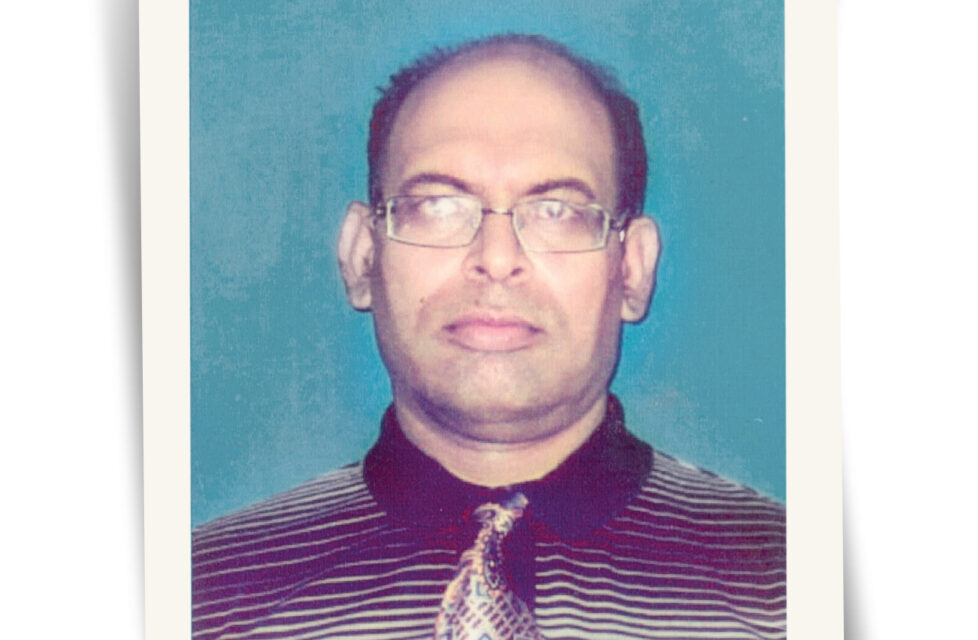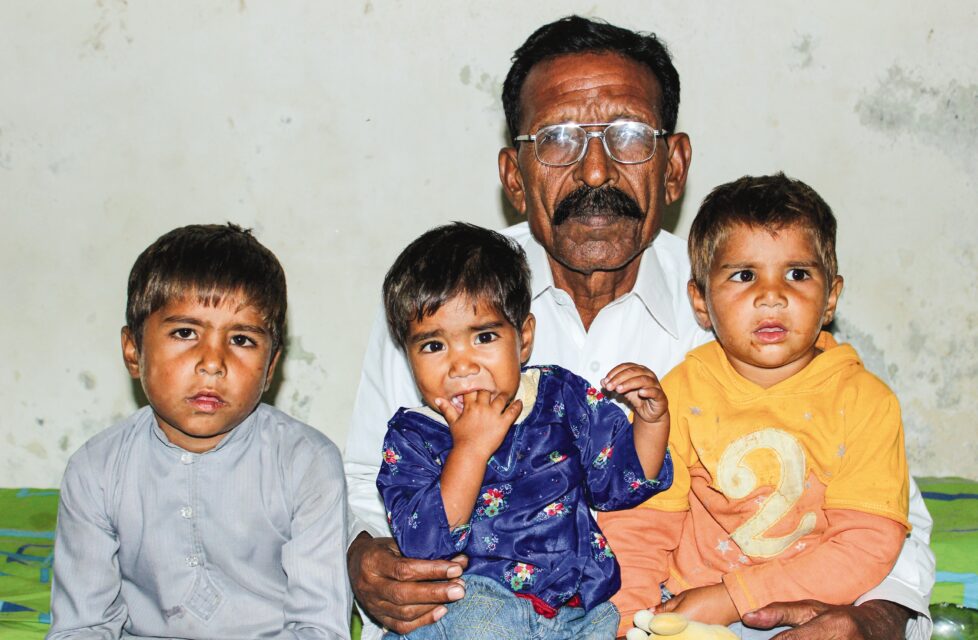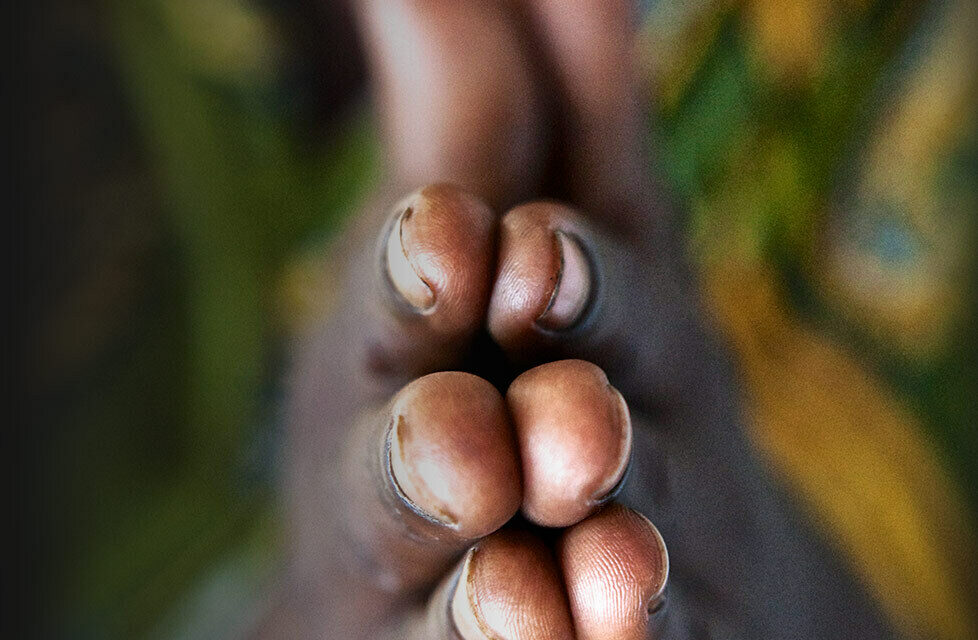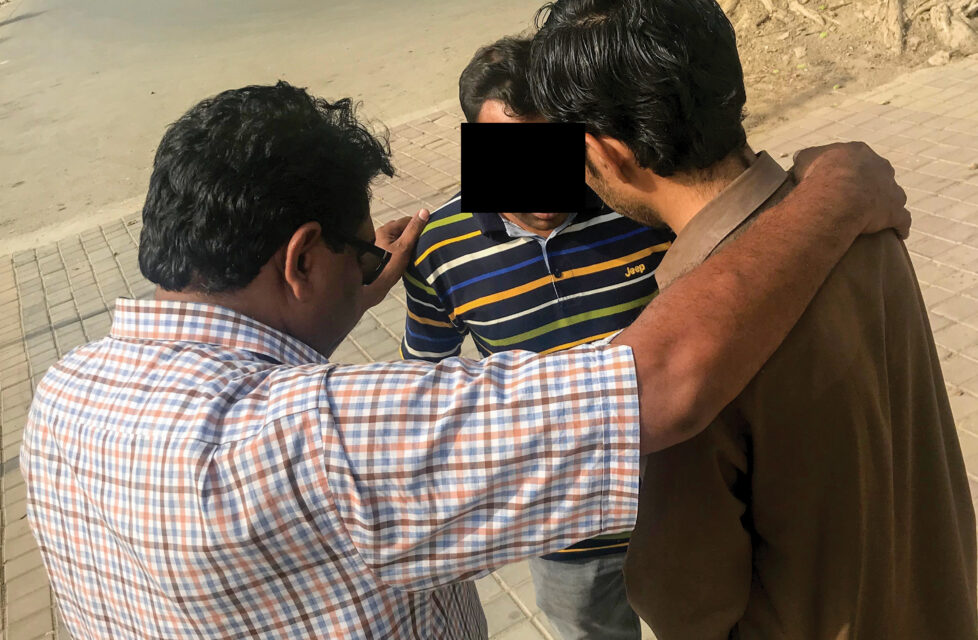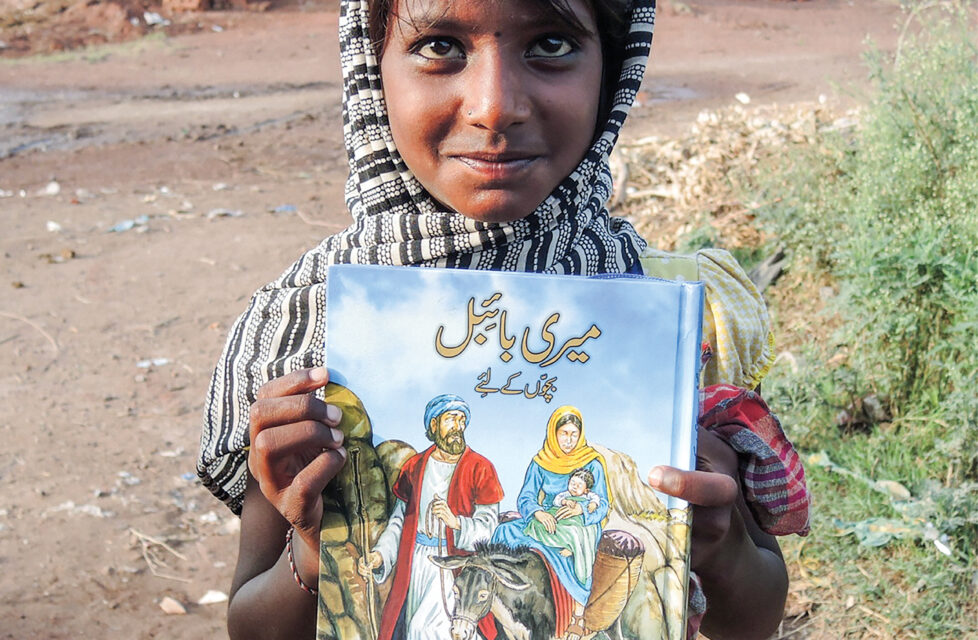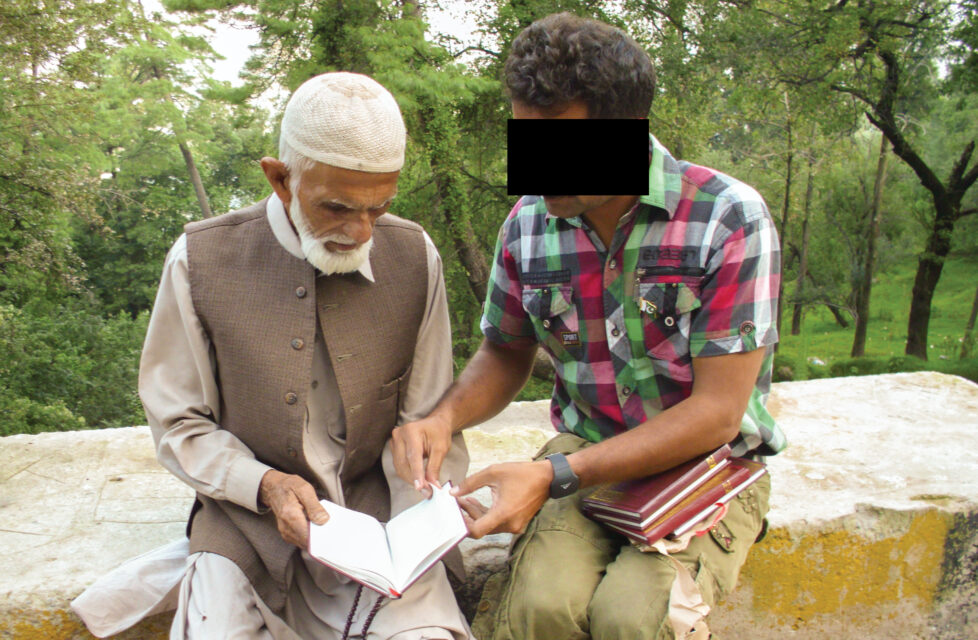Shahzad and his wife, Shama, clung to each other and prayed as more than five hundred Muslims surrounded their house, shouting insults and threats. The mosque leader had accused the couple, over the loudspeaker, of burning a copy of the Koran, fueling the mob’s rage. “They have burned the Holy Koran!” they shouted. “We will teach them a lesson!” It didn’t take long for the accusation to spread. After entering their house through a hole in the couple’s thatched roof, the angry Muslims dragged them outside. Despite their pleas for mercy and Shama’s pregnancy with their fourth child, the mob beat them ruthlessly, breaking both Shahzad’s and Shama’s legs. Next, the mob tied them behind a tractor and dragged them for more than thirty minutes. Shahzad had moved to the Pakistani city of Kot Radha Kishan in 2000 with his brothers and their father, Nazar. Because of their Christian faith, they had difficulty finding work. In Pakistan, Christians are treated as second-class citizens and often must work as street cleaners or sewage workers. Shahzad and his family found work at a brick kiln. It was hard work but provided enough money for food and a place to live, even though
Read MoreThe Bully Becomes the Beaten Paulus had no idea that the words of the man he was beating would be prophetic. As a devout Muslim working in law enforcement, he made it a point to preach Islam among Pakistan’s minority Christian community, even beating many Christians in an effort to coerce them to become Muslim. Then, one day Paulus met a pastor in a park. He discussed Islam with the man and tried to persuade him to accept what he considered the only true religion. But as a committed follower of Jesus Christ, the pastor told Paulus he could not become a Muslim. So, sticking to standard practice, Paulus violently attacked him. Between painful blows to the head, the pastor made eye contact with Paulus and said, “I am beaten for Jesus Christ, and one day you will also be beaten for Him.” Although the man’s words left an impression, Paulus would not understand what they meant until years later. Meeting Jesus Reading was a great passion of Paulus, and one day while browsing through his local book store, he curiously picked up and purchased a copy of an old book. Later, as he began to read the book, he
Read MoreThey moved to an area of Pakistan known to be influenced by the Taliban. Despite the danger, Chinese citizens Li Xinheng and Lu Ling Lina felt compelled to share the Gospel in the radicalized area. While studying Urdu, the language spoken in Pakistan, and starting a school in one of the poorest parts of the country, they built relationships with their neighbors. But their witness was not welcomed by some in the city of Quetta. In late May, Li and Lu were taking their lunch break when three armed men dressed as police officers forced them into their vehicle. A third woman, also Chinese, was kidnapped along with them, but it is unclear whether she was released because there wasn’t room in the vehicle or because she escaped and called for help. A Pakistani man saw what was happening and tried to help, but he was shot in the foot by the kidnappers. Li and Lu were held hostage for several days before their executions,which were recorded on video. The self-proclaimed Islamic State (ISIS)claimed credit for their deaths, and the Pakistani government eventuallycarried out a raid on the ISIS hideout. However, by that time the Islamistshad fled. The Chinese government
Read MoreThe terrified couple clung to each other inside their one-room home while the mob of angry Muslims outside shouted insults and threats: “They have burned the Holy Quran! We will teach them a lesson!” Shama cried as her husband, Shahzad, tightened his arms around her and began to pray. At 6 a.m., more than 500 Muslims had gathered outside the young couple’s home near the brick kiln where they worked as bonded laborers. Shama’s husband couldn’t believe the events of the last few months had come to this. Indentured Workers in Pakistani brick kilns Shahzad, his father and four brothers moved to the brick kiln near Kot Radha Kishan, Pakistan, in 2000, when Shahzad was 16. As poor Christians (Pakistan’s lowest social class), they had few employment options. While the work in a brick kiln was grueling, it at least provided them food and a place to sleep. However, as often occurs with poor Christians in Pakistan, the family soon became indebted to the brick kiln owner. The debts are eventually passed on to the children, indenturing many families for life. Although Shahzad’s family was Christian, his father, Nazar, became friends with Muslims living near the kiln. He often read
Read MoreFazal’s wife, Shahnaz, smiled as she watched her husband put onhis new shoes, excited to attend church that morning. Christmaswas just a week away, and he looked forward to taking communion that day at Bethel Memorial Methodist Church in Quetta, Pakistan.Shahnaz quietly chided him for running late, then kissed Fazal and theirson goodbye, not realizing it would be the last time she would see herhusband. Fazal and his son arrived at a church packed with people who hadcome to watch the children’s Christmas celebration. But as the congregation lined up to receive the elements of communion, four men wearing suicide vests approached the church. Seeing their intent, security personnel tried to prevent the men from entering, shooting one as he entered the compound. Two of the others fled the scene, but the fourth man managed to push his way through the entrance and detonate his explosives. Fazal’s son was preparing to receive the elements when the explosion occurred, and the woman next to him was injured in the blast. Eleven Christians, including Fazal, were killed in the attack, andmany others were wounded. The self-proclaimed Islamic State (ISIS) laterclaimed credit for the bombing. While composing less than 1 percent of the
Read More“The blasphemy law in its present form has become more of aninstrument of persecution and vendetta than of justice,” a Pakistani newspaper editorial stated. Blasphemy means showingextreme irreverence toward something sacred, and for centuries Christians have been accused of blaspheming Islam. Often in Pakistan, contrived witnesses with false accusations have spoken out against believers, sending them to jail and even to death. Such was the case with Samuel Masih, whose body was found bloodied and battered, his skull smashed. Masih spent his days as a whitewasher and painter. He had justfinished a job and stopped at the local mosque in order to use the restroom. As he returned outside, bystanders grabbed him and shoutedaccusations. Masih’s accusers, knowing he was a Christian, claimed thathe had spit on the walls of the mosque; two false witnesses confirmedthis story. Samuel was immediately arrested and put on trial. Under the maximum penalty for violating Section 295 of the Pakistani penal code, Masih could have been jailed for two years and fined,if convicted of “defiling a place of worship with the intent of insultingthe religion (Islam).” The pungent odor of urine and sweat filled the dirty prison. Thesounds of coughing and scuffling feet echoed along
Read MoreA front-line worker recently requested prayer for a Muslim family who came to Christ after studying Scripture. Shakeel and his family were Muslims who shared a home with a Catholic Christian family. A Christian worker was visiting the Christian family regularly for prayer and encouragement when he was introduced to Shakeel’s family. The worker prayed for the Muslim family, and they felt moved and peaceful during his prayer.
Read MoreGrowing up in Pakistan, Abdul lived under strict Islamic law within an oppressive shame culture. His uncle, the head of his extended family, was an Islamic leader in the community, and the Quran was the source of ultimate authority over his life. As Abdul grew older, however, he began to worry about where he would spend eternity. He often thought of heaven and discussed the afterlife with his uncle, but his uncle simply assured him that he would get there. “You know you are doing a good job,” he told Abdul. “You will go to heaven.” Instead of providing comfort, his uncle’s words offended him. He knew he had not lived a good life, even by his own standards. And surely heaven’s standards were higher than his own, he thought. The Islamic view of heaven suddenly felt cheap to Abdul. After further conversations about Islam with family members, Abdul’s disgust with his life grew so intense that he wanted to commit suicide. Distraught, he shared his feelings and dark intentions with a friend. To Abdul’s surprise, his Muslim friend challenged him to take a Bible correspondence course that he had been taking. Abdul signed up for the course and soon
Read More“Give us more!” the robbers demanded. It was 9 p.m., and Faisal’s Bible distribution team was eager to be home. After delivering Bibles to eleven Pakistani villages in three days, they had taken a shortcut to get home faster. But as the team slowed their old van to navigate a bumpy stretch of road, they found themselves surrounded by a band of robbers notorious in that part of Pakistan. Rajehs, one of the workers riding in the van, tried to reason with the six armed men as one of them pointed a gun at the driver and another held a gun against a passenger’s leg. “We’ve given you everything,” Rajehs told them. “Why do you want to kill us?” But even as they were rolling down their windows to hand over their valuables, he knew that the robbers would likely force them out of the van and shoot them one by one. “We have Bibles,” offered 13-year-old Amber, the team’s youngest member. “Please take a Bible.” “We don’t need it!” a robber screamed, throwing the Bible down. A mile and a half ahead of them on the road, Pastor Faisal and the rest of the team waited nervously in the
Read MoreAs a member of Pakistan’s tiny Christian minority, Hamid was treated poorly by Muslims in his community. By God’s grace, however, today Hamid loves and shares Christ with his persecutors. Growing up, Hamid Banday had every reason to hate the Muslims in his Pakistani village. His Muslim classmates bullied him, and villagers harassed and discriminated against his family because of their Christian faith. Village authorities even denied them use of the local water well during peak summer heat. Hamid never saw a reason to show love to Muslims … until he realized God had told him to. With God’s guidance and help, he now tries to see Muslims as God sees them, as people made in His image who are in need of a savior. “I think I am learning every day not to hate Muslims,” Hamid admitted. “Sometimes, you know, these feelings are very much grounded inside me from my childhood. Every day I try to overcome these feelings. Somehow I am often successful through His grace, but every day I pray, ‘God, remove the hatred from my life.’” Tough Lessons Hamid is among the fraction of 1 percent who know Jesus in his village. The other 99 percent
Read More

